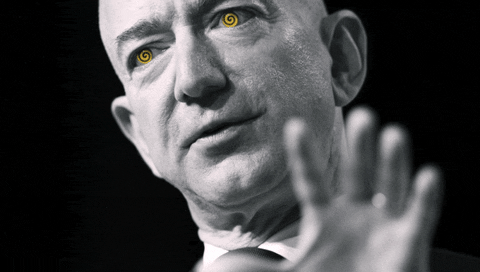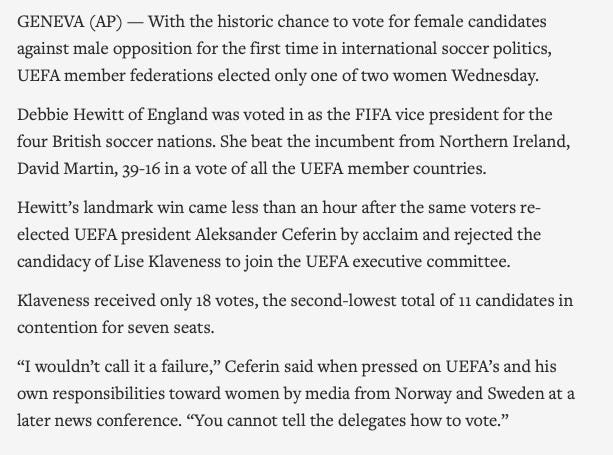What's the point of Amazon sport; The UEFA Boys Club; DAZN WTF; Inside the WTA; The sport as creator problem; Betting's gotcha moment; Today's Golfer for sale; Attribution errors and sports rights
Overthinking the sports business
Today’s newsletter is sponsored by our friends at Turnstile, who are asking a good question: do you know what your sponsorship is really worth, or are you guessing?
Turnstile uses real market rates to quantify the value every single sponsorship right within a deal, looking beyond the traditional media metrics to calculate the value of the Exposure, Intellectual Property and Direct Benefits.
This enables Turnstile to deliver a recommended transaction price that’s comprehensive, accurate and defensible.
So don’t pay too much. Don’t leave money on the table. Know the fair market price, and buy and sell with confidence. If you value your sponsorships, value them properly.
Get in touch with Turnstile at turnstilegroup.com
‘Boy, boy, boy, boy, boy, boy, boy, boy….
UEFA’s dinner seating plan explained via the medium of Family Guy
Quote of the Week: Aleksander Ceferin: ‘I wouldn’t call it a failure’
Graham Dunbar of AP provides context:
See last week’s podcast with Moya Dodd on her days on the FIFA ExCo.
What does Amazon stand for?
It’s hard to read Hollywood Reporter’s long form dissection of Amazon Studios and not make the jump to the company’s sport strategy.
Summary: the results have been underwhelming, the outlay enormous and beyond shopping, its hard to discern any centralising rationale or ethos.
Some assorted quotes give a flavour:
“There’s no vision for what an Amazon Prime show is. You can’t say, ‘They stand for this kind of storytelling.’ It’s completely random what they make and how they make it.”
‘A confusing and frustrating place to do business’
Many current and former Amazon executives, as well as showrunners who have series at the streamer and agents who make deals there, believe that this is no accident. They describe Amazon Studios as a confusing and frustrating place to do business. When it comes to movies, where Amazon’s footprint is expanding following the $8.5 billion acquisition of MGM a year ago, a veteran producer says that, in recent years, “there has been no sense of what the philosophy is.”
All we know for sure is that it’s all about shopping.
“The proof exists that the giant tentpole shows are driving people to subscribe to Prime,”
International is everything…
Like Apple, Amazon is not a traditional entertainment company but a huge retailer with a side hustle in Hollywood. Amazon’s view is that the more hours you spend watching Prime Video, the more likely you are to renew your membership and the more likely you are to shop on the site. As Amazon, like Netflix, pursues overseas growth in the wake of saturation in the U.S., Salke notes that in some countries like South Africa and Argentina, Amazon’s programming is the tip of the spear, entering the territory before retail sales or fast, free shipping is even available. “International is everything,” she says. “It is our business to deliver global shows for a global audience.”
The four quadrant audience
We would say we have a big, broad audience, and we are looking for content that entertains the four quadrants.” (That is, male and female, under 35 and over 35).
The conclusion is worth pausing on.
One argument is that the problem is cultural.
Amazon is a data company: Cold, emotionless, dispassionate.
The film (and sport?) industry is different.
“She (Amazon Studio chief Jennifer Salke) shot from the hip, she went with her gut, and she didn’t let data overrule her,” this person says. “But she hired a staff that was in over their heads in terms of being able to get those shows produced at a number.
This paragraph is fascinating.
There’s a sense in Hollywood that film is just another test and learn exercise, albeit at massive cost.
Some are factoring in the risk that Amazon could just turn around one day and close the shop. Sports rights holders will have similar thoughts.
For now, the message is clear: take the money upfront.
Amazon v Arse Flame Bloke
Amazon is pushing its Just Walk Out technology as the solution to in-stadia queuing.
This will be welcomed by among others, Sir Clive Woodward, who was horrified to discover people drinking beer at Twickenham. (See previous: Woodward v Big Eventers…Fight! Fight! Fight!)
The idea behind Just Walk Out is laudable.
But bigger tests await, in the form of the English football fan.
See also:
Spoiler: Golf magazine reviews are bought and paid for…
BBC’s You and Yours gave Today’s Golfer a kicking for flogging so-called independent club reviews to advertisers.
So every TaylorMade, Titleist and Ping product is a hit.
But Lynx doesn’t get reviewed.
It’s why MyGolfSpy exists.
See also:
Sport Resolutions rule in favour of DP World Tour over LIV players.
The marketing of The Masters, a piss take.
DAZN and the question of attribution
DAZN’s Veronica Diquattro and marketing consultant Richard Johnson came on the podcast this week.
Three of my current questions were aired:
How do you attribute subscribers to specific rights?
How long’s long enough, when judging whether a sports acquisition has been successful?
How many sports are worth building a home for?
Diquattro is very good on the important data point of a user’s first click after subscription.
See also:
Won’t anyone think of Len Blavatnik?
Coverage of DAZN often has an odd tone.
I’m always a bit surprised that people seem to get properly annoyed about the money.
‘When will they ever break even?’ Etc.
Who cares how much money they’re losing? The bloke’s a billionaire.
The counter is that DAZN are real-life testing many of the theories put forward by the consultancy class.
Sports betting’s Gotcha moment
Another tory MP is caught trying to sell access to the parliamentary decision making process.
‘Lobbying is the next big scandal’. David Cameron, 2010.
WTA are surprised by Christmas
Pod guest Marina Erakovic took us inside the real life of the WTA Tour as part of our Re:Thinking Sport series collaboration with Portas Consulting.
This was revealing:
I remember when I was playing towards the end of my career, there was a big panic in the WTA because they realized they’d been marketing a specific few players for so long - the Sharapovas and Williams of the world - and now they're about to retire and, ‘Oh crap!’
And now the men have a very similar problem with Nadal and Djokovic probably on their last legs, and what now?
Cue Break Point, I guess.
See also: the inherent conflict within the Athlete as Creator vibe.
Erakovic: My advice is, if you can, don't run your own social media as an athlete. Get someone to do it for you.
It's a double edged sword. It gives you great opportunity, exposure, publicity, more sponsorship equals more money, means you can pay for more things, get more support for your career. But on the other side, it's so bad for your mental health.
I remember sitting in a locker room somewhere with my good friend Madison Keys, and she would get pages and pages of abuse, and you don't want to read that stuff. You know, it's death threats and ‘You're not good’, or ‘You're fat’, or whatever it is.
It's just horrendous.










